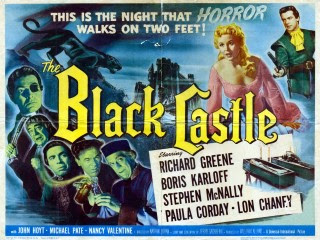Ah, Hallowe'en! Crunchy leaves underfoot, cozy sweaters, and movies. Oh, the movies! The Universal Studios logo, the Swan Lake theme, and the familiar and welcome chills. Of course, that is when we go back to the early 1930s with The Mummy and Frankenstein and Dracula. Today let's visit with a favourite from my childhood, the Universal-International release of The Black Castle, 1952.
Academy Award-winning art director (How Green Was My Valley) Nathan Juran (The 7th Voyage of Sinbad) directed the story and screenplay by Jerry Sackheim (The Strange Door, The Boy and the Pirates). It is, to quote a character in the movie, "a mad adventure."
The castle in the Black Forest is the domain of Count Karl von Bruno played by Stephen McNally. Within the castle walls is a crowded and desolate graveyard. It is that graveyard that is our introduction to the story. Two servants are preparing the coffins of their mistress Countess Elva von Bruno played by Paula (Rita) Corday* and the dashing Englishman Sir Ronald Burton played by Richard Greene.
Richard Greene
Of one fact, the servants are unaware; the couple is about to be buried alive! They know their fate and so does the Count. The Count is a madman and a murderer, and that is what brought Sir Ronald to the castle under an assumed name.
Count von Bruno had crossed paths in Africa with a group that included Sir Ronald and his two closest friends, Sterling and Brown. Sir Ronald was not involved in the confrontation, but it was a violent one in which Count Bruno lost an eye. The Count eventually took vengeance by killing the two Englishman. At least, that is what Sir Ronald hopes to prove by accepting an invitation as Richard Beckett to hunt in the Black Forest.
Michael Pate, John Hoyt, Stephen McNally
A man such as Count von Bruno would certainly retain a physician of sorts at his estate. Boris Karloff plays Dr. Meissen, whose enigmatic smile keeps the audience guessing as to his thoughts and his motives, although it is clear he enjoys arousing the ire of his betters.
Lon Chaney Jr. plays Gargon, a longtime servant of Count von Bruno. He lost his tongue to natives in that battle in Africa. Does he recognize Sir Ronald from that time? He may be confused about the guest, but he is not confused about his duties as he gleefully helps his master torture a leopard imported for the pleasure of the hunters assembled at the castle.
Countess Elga is a sensitive soul who cannot bear to see the leopard ill-treated. Married to the Count by contract six months previously, they are a poorly matched pair and the audience can see her valiant struggle to maintain her own personality under such power. It is not a surprise that she and "Richard Beckett" are drawn to each other.
Richard Greene, Rita Corday
The castle is filled with disturbing characters and incidents. It has a working dungeon, and it is filled with hidden passageways and booby-traps. Beckett and Elga discover this on an impromptu tour. Beyond this passage is a drop to a pit of alligators. They escape unscathed this time. Who will not?














































